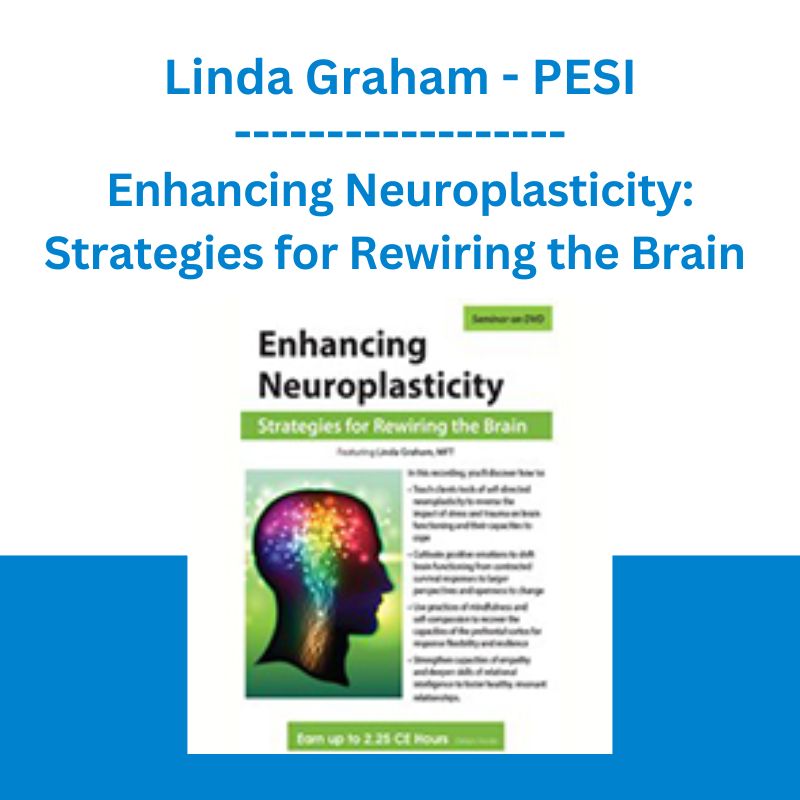*** Proof of Product ***
Exploring the Essential Features of “Enhancing Neuroplasticity: Strategies for Rewiring the Brain – Linda Graham – PESI”
The more we apply the discoveries of neuroscience to our clinical work, the more skilled we can become at tailoring interventions to match clients’ specific difficulties and guide them through the changes in brain functioning that best catalyze their growth. Whether clients are stuck in repetitive defensive patterns, struggling to stabilize a coherent sense of self, or progressing slowly toward new resilient behavior, teaching clients specific tools for rewiring the brain can lead to their thriving and flourishing beyond the consulting room. In this workshop, you’ll discover how to:
- Teach clients tools of self-directed neuroplasticity to reverse the impact of stress and trauma on brain functioning and their capacities to cope
- Cultivate positive emotions to shift brain functioning from contracted survival responses to larger perspectives and openness to change
- Use practices of mindfulness and self-compassion to recover the capacities of the prefrontal cortex for response flexibility and resilience
- Strengthen capacities of empathy and deepen skills of relational intelligence to foster healthy, resonant relationships.
Speaker
Linda Graham, MFT
Linda Graham, MFT, is an experienced psychotherapist in the San Francisco Bay Area, bestselling author and international speaker. She integrates modern neuroscience, mindfulness practices, and relational psychology in her worldwide trainings. She is the author of Bouncing Back: Rewiring Your Brain for Maximum Resilience and Well-Being, winner of the 2013 Books for a Better Life award and the 2014 Better Books for a Better World award. She publishes a monthly e-newsletter, Healing and Awakening into Aliveness and Wholeness and weekly Resources for Recovering Resilience.
Linda draws on her own experiences of healing and awakening as well as more than two decades of integrative study, practice and teaching of transformational psychotherapies, vipassana meditation, life coaching, and facilitating groups and workshops to become a skillful guide interweaving many paths of compassionate, conscious connection. She is passionate about integrating the paradigms and practices of modern neuroscience, Western relational psychology and Eastern contemplative practice.
Speaker Disclosures:
Financial: Linda Graham maintains a private practice. She receives a speaking honorarium and recording and book royalties from PESI, Inc. She presents professionally and receives compensation, and she receives royalties as a published author. She has no relevant financial relationships with ineligible organizations.
Non-financial: Linda Graham has no relevant non-financial relationships.
Outline
- Choosing experiences to rewire the brain
Mindfulness - Compassion
- Tools of intelligence
- Purposes of enhancing neuroplasticity
Regulation, relation, reflection and resilience - Strategies for implementing positive neuroplasticity
- Brain structures and systems related to perception of safety
Functions of sympathetic and parasympathetic nervous system
Consequences of hypoarousal and hyperarousal
- Unconscious nature of autonomic systems
- Therapeutic interventions to optimize feelings of safety
Beneficial exercises: breath, touch, posture and movement
Nonverbal cues and therapeutic communication
- Therapeutic resonance and healing
Techniques for developing resonance
Deep listening and acceptance of emotions
- Mindfulness and self-compassion
- Therapeutic exercise: Compassionate friend
- Shifting brain functioning through positive emotions
Neuroscience research
Gratitude exercise: Web of life
- Imagination
- Default mental play space
Therapeutic exercise: Wished for outcome - Meta-processing and brain change
Journaling and creating a coherent narrative - Summary and clinical take-aways
Objectives
- Discover how to teach clients tools of self-directed neuroplasticity to reverse the impact of stress and trauma on brain functioning and their capacities to cope
- Discover how to cultivate positive emotions to shift brain functioning from contracted survival responses to larger perspectives and openness to change
- Discover how to use practices of mindfulness and self-compassion to recover the capacities of the prefrontal cortex for response flexibility and resilience
- Discover how to strengthen capacities of empathy and deepen skills of relational intelligence to foster healthy, resonant relationships
Target Audience
Addiction Counselors, Marriage and Family Therapists, Nurses, Social Workers
Please see the full list of alternative group-buy courses available here: https://lunacourse.com/shop/









